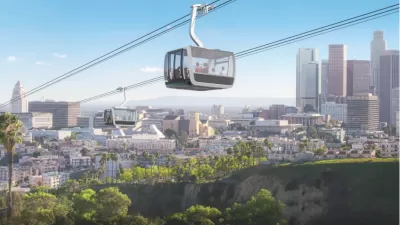A closer look at a plan for Los Angeles linking Dodger Stadium to the subway points to the proposal’s many flaws.

Not long after revealing a proposal for high-speed rail to the O’Hare Airport in Chicago, Elon Musk moved on to Los Angeles and unveiled his grand plan to construct a tunnel connecting Dodger Stadium to the Red Line. Alon Levy examines The Boring Company’s plan and concludes that its many problems outweigh any potential benefits.
For one, says Levy, the cost estimates seem low and based on questionable assumptions, particularly because any Red Line terminus would be located in a dense area with complex construction needs. In addition, the proposed plan would not move enough riders:
By Boring's own admission, the line would only have enough space for 2.5 percent of Dodger Stadium's capacity. The small tunnel diameter and very small vehicles ensure that capacity would be limited from the start with no room for expansion.
Levy also argues that the proposed route to the Red Line does not make sense when Union Station, just over a mile from Dodger Stadium, already serves a multitude of rail lines. Achieving maximum benefits for a tunnel such as this needs to be an important consideration, says Levy:
Dodger Stadium-Vermont is not really useful except for those traveling from Hollywood or North Hollywood to Dodger Stadium; the tunnel would be unused except for a short period before and after a Dodgers home game. It might be useful to Musk as a proof of concept in the unlikely event he can fulfill his promise of cheap construction, but it cannot make money with such low utilization.
In the end, Los Angeles needs to reject a project that is not likely to succeed, concludes Levy. “If Musk wants to bore tunnels, he should do so under private property and side streets and pay the owners a negotiated fee rather than getting access to a potential metro corridor,” he adds.
FULL STORY: Elon Musk's Solution for Dodger Stadium Traffic is Full of Holes

Alabama: Trump Terminates Settlements for Black Communities Harmed By Raw Sewage
Trump deemed the landmark civil rights agreement “illegal DEI and environmental justice policy.”

Study: Maui’s Plan to Convert Vacation Rentals to Long-Term Housing Could Cause Nearly $1 Billion Economic Loss
The plan would reduce visitor accommodation by 25% resulting in 1,900 jobs lost.

Planetizen Federal Action Tracker
A weekly monitor of how Trump’s orders and actions are impacting planners and planning in America.

Waymo Gets Permission to Map SF’s Market Street
If allowed to operate on the traffic-restricted street, Waymo’s autonomous taxis would have a leg up over ride-hailing competitors — and counter the city’s efforts to grow bike and pedestrian on the thoroughfare.

Parklet Symposium Highlights the Success of Shared Spaces
Parklets got a boost during the Covid-19 pandemic, when the concept was translated to outdoor dining programs that offered restaurants a lifeline during the shutdown.

Federal Homelessness Agency Places Entire Staff on Leave
The U.S. Interagency Council on Homelessness is the only federal agency dedicated to preventing and ending homelessness.
Urban Design for Planners 1: Software Tools
This six-course series explores essential urban design concepts using open source software and equips planners with the tools they need to participate fully in the urban design process.
Planning for Universal Design
Learn the tools for implementing Universal Design in planning regulations.
Caltrans
Smith Gee Studio
Institute for Housing and Urban Development Studies (IHS)
City of Grandview
Harvard GSD Executive Education
Toledo-Lucas County Plan Commissions
Salt Lake City
NYU Wagner Graduate School of Public Service




























